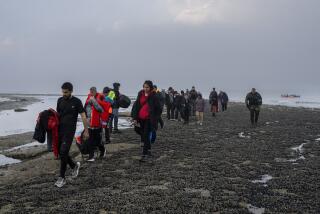The sprawling refugee camp in France known as ‘the Jungle’ is about to close
It’s squalid and dangerous, crowded and muddy – and home to thousands of migrants desperate to reach Britain.
French officials said Friday the sprawling encampment known as “the Jungle,” outside the port city of Calais, will be closed in the next few days and its inhabitants sent to hundreds of reception centers across the country -- a move that threatens to set off a new wave of anti-migrant sentiment.
The camp has been seen as a symbol of the failure of President Francois Hollande’s government to deal with the migrant crisis roiling all of Europe. Human rights activists decry miserable living conditions in the camp, and inhabitants are often injured or killed trying to make their way to Britain aboard trains or trucks heading into the Eurotunnel under the English Channel.
In French towns where the migrants will spend up to four months awaiting a determination as to whether they can apply for asylum or are to be sent home, there are already signs of angry dissent. Many of the migrants are from war-torn countries such as Afghanistan, Iraq and Syria; others, including many from African nations, are trying to escape desperate poverty.
In one small southern town, Beziers, the far-right mayor caused a stir recently when he put up posters reading ominously: “They’re coming.” Demonstrations have been staged in other communities, despite efforts by French officials to calm fears.
The camp and the fate of its inhabitants have already emerged as contentious issues in France’s presidential elections, to be held next year.
After Britain’s June vote to exit the European Union, there has been a groundswell of sentiment in France in favor of revoking an agreement that essentially puts Britain’s southern frontier on French soil, allowing British officials to carry out border checks there.
French center-right politician Alain Juppe, considered the presidential front-runner, said this week that such checks should take place on the English side of the channel.
“We cannot accept making the selection on French territory of people that Britain does or doesn’t want,” he told the Guardian newspaper. “It’s up to Britain to do that job.”
Far-right politicians have long seized on the burdens and disruptions caused by the camp, adding fuel to fears galvanized by a string of terrorist attacks. Those attacks included the July truck rampage in the Riviera city of Nice carried out by a Tunisian deliveryman, and the slaying of a French priest by two teenagers of Algerian descent who claimed allegiance to Islamic State.
After months of delays — including a court challenge on humanitarian grounds, which was rejected this week — French officials on Friday unveiled their timetable for closing the camp. On Sunday, authorities will fan out and inform migrants — 6,486 of them, by official count — that they must gather at 8 a.m. Monday at a huge hangar adjacent to the camp.
From there, they are to be sorted into groups depending on age, family and special conditions such as being unaccompanied minors or otherwise vulnerable. Buses are to begin leaving that day, and the camp’s dismantling is meant to be completed within a week, officials said.
But all may not go according to plan. Activists advocating free movement for the migrants have previously staged protests, and may seek to do so again. Heavy security is expected to be in place, with more than 1,200 police deployed to oversee the operation.
Hollande, facing a tough battle for reelection, plans to visit Calais on Monday as the dispersal is getting under way.
The unpopular French leader has been trying to lay the groundwork for temporarily resettling the migrants around the country. On a recent visit to the city of Tours, where some of the migrants are to be sent, he cited the “unacceptable” conditions in the camp, and pointed to the hardships that many there are fleeing.
Some migrants have spent years in the camp — various precursors have existed around Calais since 1999 — and many in France’s political establishment view it as a problem that has resisted all attempts at a solution. The camp was partly disassembled this year, but even more migrants arrived, nearly doubling its population.
In an effort to minimize animosity in the host cities and towns, the reception centers are to be relatively small, holding between 40 and 50 people, authorities said. Unaccompanied teens and children are to be housed separately from adults.
Hollande has tried, at least indirectly, to make a case that France needs to do its part to help migrants, noting that Germany saw some 1 million arrivals last year. That position appears to have only increased his unpopularity, however.
Britain has barred most of the migrants from entry, citing European Union rules requiring that they seek asylum in the first European country they reach. It has accepted small numbers of unaccompanied minors with family ties in the United Kingdom, and humanitarian groups are pressing Britain to take in more.
But anti-immigrant sentiment in Britain, illustrated by the Brexit vote, has muted calls for larger numbers to be resettled. Last week’s arrivals triggered a social media outcry over whether they were all genuinely under 18, or lying about their ages. Humanitarian groups said the youths had all been carefully assessed before being fast-tracked for family reunions in Britain, but that hardships made some appear older than they were.
At the camp, conditions have only become more wretched over the years. Most people live in tents or makeshift shacks, or even sleep in the open. Sanitation is poor and disease is rampant. Medical care is limited; all the migrants are to receive medical checks at the reception centers when they arrive next week.
More to Read
Sign up for Essential California
The most important California stories and recommendations in your inbox every morning.
You may occasionally receive promotional content from the Los Angeles Times.











